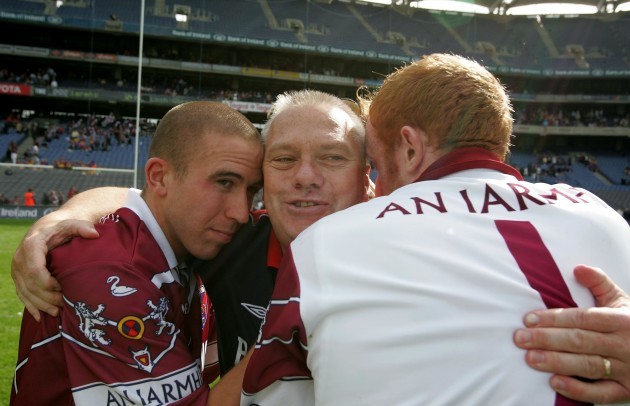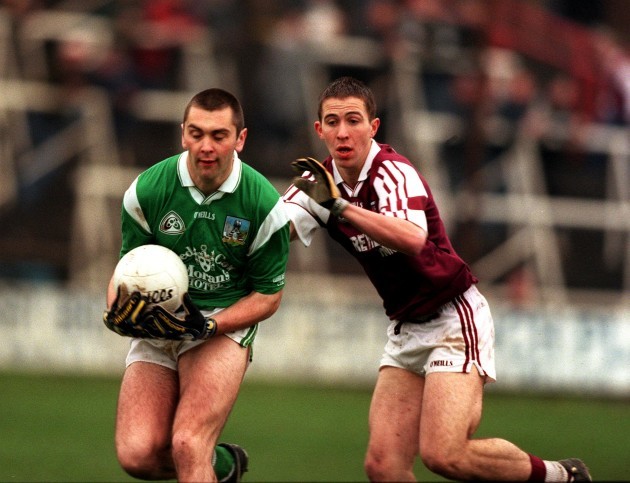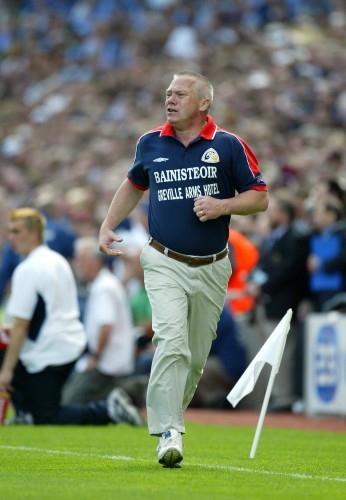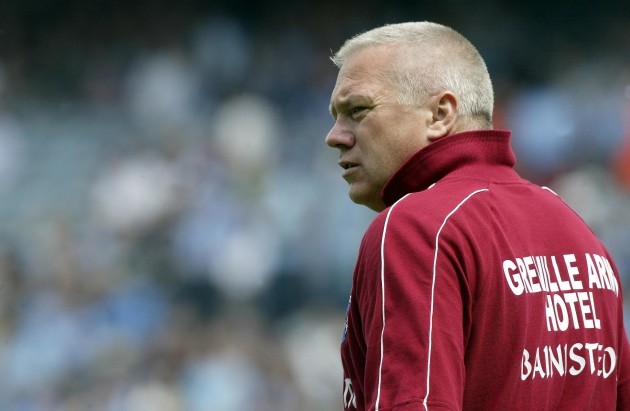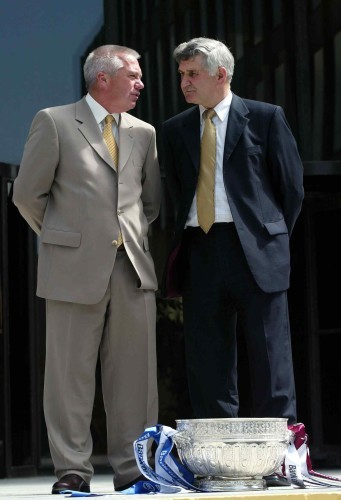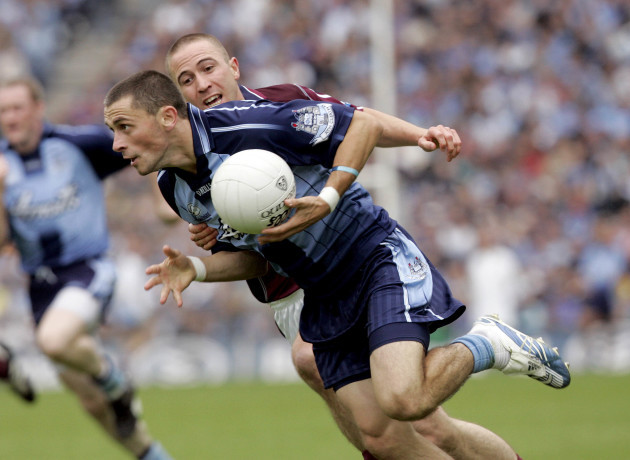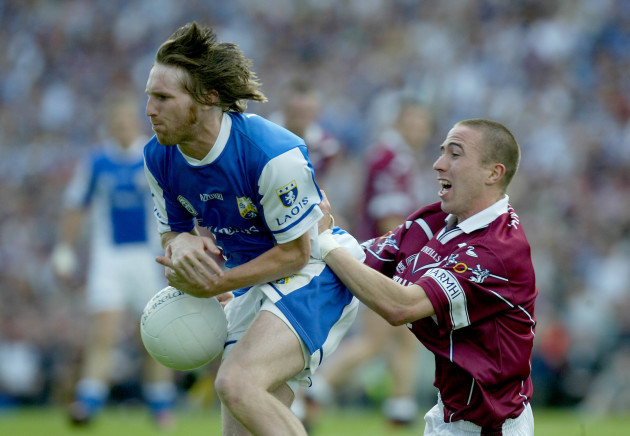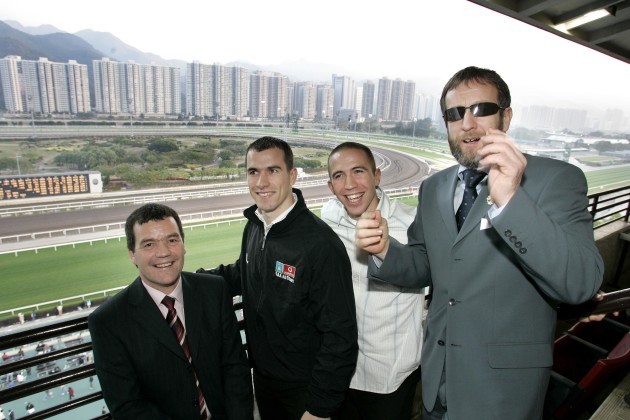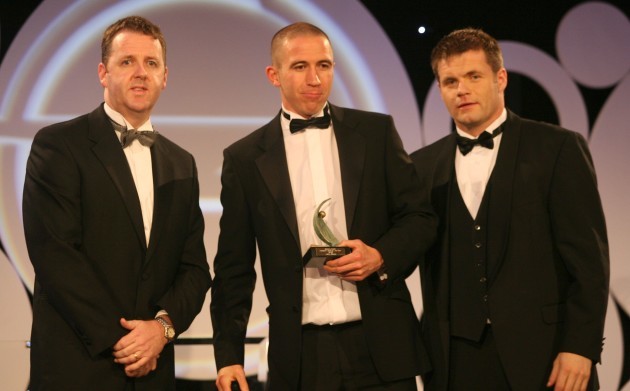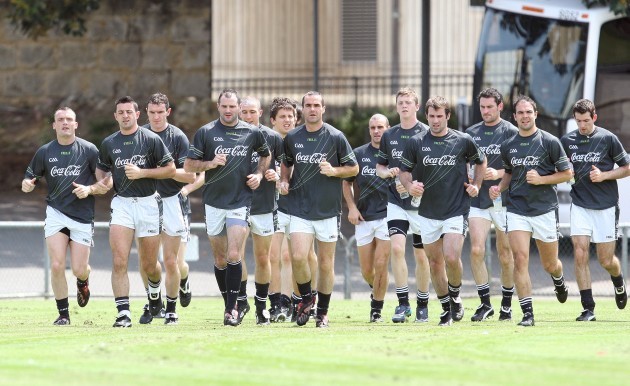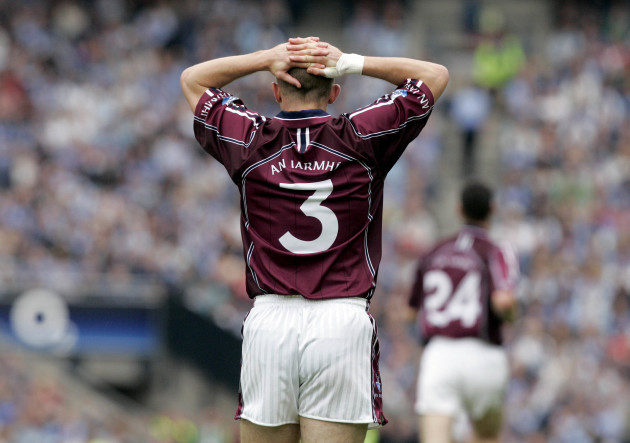WESTMEATH’S 2004 CREW will gather later this summer to mark the 15th anniversary of their famous Leinster final replay victory over Laois.
In 2014, a decade on from the only provincial title in their history, the county board organised an official function for the players and backroom team. This time around things will be more low-key, like a round of golf and a few drinks after.
It’s been increasingly common for the old team-mates to bump into each other over last few years, usually bringing their children to different events. More often than not, it involves GAA.
This weekend, two-time All-Star John Keane hopes to bring his son to Tullamore for the Leinster SFC quarter-final clash between his native county and Laois. It’s a game that ignites memories of the 2004 provincial final between both sides, when Páidí Ó Sé inspired the most famous day in the Lake County’s history.
“It’s flown past,” Keane tells The42. “I was only chatting to a few of the lads lately, we’re going to gather something together for something soon enough.
“It’s amazing to think that it’s 15 years but the knees wouldn’t tell me that, they’d know well it’s 15 years ago. It’s amazing how quickly time goes when we’re all busy with kids and the whole lot.”
Long before Ó Sé’s shock arrival as manager, the groundwork was being laid in Westmeath for future success. When a county makes a breakthrough at senior grade, the roots can often be traced back to important victories at underage level in the years previous.
Westmeath’s trailblazers came in the form of the 1995 All-Ireland minor winners, where Keane’s brother Cathal was part of the team. An All-Ireland title at U21 level followed in 1999, while John helped them retain their Leinster crown the following year. Gary Connaughton, Dessie Dolan and Fergal Wilson were among his team-mates who’d go on to become household names in the game.
Having watched his brothers Cathal and David represent Westmeath at the top level, John always felt destined to make the breakthrough.
I would have always assumed that I was going to play county senior, not in a cocky way but I assumed that’s what was going to happen because that’s the way the lads were.
“When we were younger, Dad would have brought us to every single game anywhere in the country. When I was going to see David play – it was back in the mid-90s – and you’d generally be going to places like Carlow, Wicklow and Wexford.
“You weren’t going to Dublin or Meath too often. It definitely did help having brothers playing with the county. When teams are winning or someone is involved that you know, you’ll become more connected with it and it just gives you that bit more drive as a youngster.”
The successful minor side and two U21 teams – allied to a core of seasoned veterans – turned out to be the perfect blend at senior level. Those groups formed the bulk of the Leinster-winning side in 2004.
There was no real science behind the talented crop that emerged in the county.
“I don’t think there was any county-wide luck of coaching or anything like that, a good group did come together,” says Keane. “Right now it’s much harder to get a group out of nowhere that would come through without having the work done from U13 level.
“It doesn’t really happen anymore because there’s so much conditioning. Back then if you got a good group of footballers who were able to play football, were hungry enough for it and happened to be fit enough as well, you could pull off results like that. It is a bit different nowadays. There was just those three core groups.
You could say we were very lucky, I think it was only a bit of luck. We worked very hard, we deserved to get our Leinster title and we’ll always say we should have won more than one.
“The luck side of it was the case that we all came together around the same time. But there’s a lot of better footballers than any of us that played in teams that never won anything.
“We have that bond from all the teams, those three core groups that came together at the same time. There was a strong bond that amalgamated together into one unit.”
It took some time for the wheel to start turning. Keane’s first two seasons at senior level ended in Leinster exits to rivals Meath. In 2001, during his debut championship campaign, Ollie Murphy scored a late goal as the Royals overturned a nine-point deficit to steal a late victory.
Keane had been marking him. It was a real baptism of fire for the young defender.
“He was one of those footballers, he was probably the best guy to start your career off marking because it kind of teaches you lessons and keeps you concentrated for the 70 minutes,” he recalls.
That was the first year of the qualifiers and a four-game odyssey in the first year of the backdoor system – including a big round 4 win over Mayo – brought Westmeath face-to-face with Meath in the All-Ireland quarter-final.
Once again, Luke Dempsey’s team let a significant lead slip – this one eight points – as a grizzled Meath side fought back to force a draw. The Royals, who lifted the Sam Maguire two years earlier, boasted star names like Darren Fay, Trevor Giles and Graham Geraghty and prevailed in the replay.
Meath ended Westmeath’s interests in Leinster in ’02 and ’03 as well, although Keane spent the latter year kicking ball in the States. By the time he returned, Dempsey, the man who masterminded those minor and U21 successes, had vacated the hot-seat.
Nobody could have predicted what would happen next.
All-Ireland winning manager Ó Sé and Kerry parted company after a high-profile fall-out. Within a week, he was announced as the new Westmeath manager. It sent shockwaves through the county.
“Páidí just came out of the blue and all of a sudden he was in,” says Keane.
“Some of the county board delegates met him and made the call. He was after going through a rough time with Kerry at the time. He said ‘yeah’ and that was it.
“I was lucky enough to be on a very good college team in Maynooth at the time. Marc Ó Sé was in college with me and I’d have been friendly with him.
I would have been listening to the legends about Páidí and the stories. When the announcement came I already had it in my head I was going back. I’d gone to America the previous summer but I was back in 2004.
“It was great news and it gave the county a boost. It was one of those big appointments that everyone was very optimistic about and everyone wanted to be involved in.
“Supporters were eager for it and there was a core group there to work with. Páidí wasn’t walking into a group of lads where he had to make silk out of a sow’s ear.
“Everyone knows the legend that is Páidí. He was a very unique type of guy. He used to say, when the cuckoo raises its head that’s when he comes into form. He was there all during the league and we just about stayed up.”
But like his old boss Mick O’Dwyer, Ó Sé was a different animal when it came to the championship.
“I remember the first training session back after the league, low and behold Páidí arrives out in the shorts, boots – the whole lot! Togged and ready for action. Looking fit and well.
“That’s the type of guy he was, he was able to just turn it on when he needed to. From then on he was just phenomenal, different class. It’s just the little things he’d do. He wouldn’t be one for ringing you and having long rambling phone calls.
“He’d rather talk to you face to face on the pitch, jogging across the pitch with you. He could pull two or three of ye together and he’d jog from one side of the pitch to the other before training would start.
“Everyone would be there good and early and he’d pull you in, as he’s talking to you he’d be explaining things. Next thing you’d turn around and he’d be disappeared. He’d be gone the other way with a different group, talking with them. That was his style.
Anyone from Kerry and Westmeath will be able to tell you: in the heat of battle in Croke Park in that dressing room beforehand and at half-time, there was no better place to be than listening to that guy talking.”
A disputed point helped Westmeath past a strong Offaly team in the opening round of Leinster, before they faced Dublin – long-time rivals of Ó Sé’s – in the last eight.
The brilliant fly-on-the-wall documentary, Marooned, which charted Westmeath’s season that year captured a classic moment that summed up Ó Sé’s personality. Shortly after the win over Offaly, he was making his way towards a hotel on the main street in Mullingar when a man wearing a Dublin jersey walked by.
Recognising the Kerry legend, Dub remarked: “See you in a fortnight.”
Quick as a flash and with a twinkle in his eye, the Kerry man responded: “You’re sure you will.”
Two weeks later Dublin’s lead would have hit double-figures inside the first quarter if they’d taken their chances early on. But the Lake County hauled themselves back into the game and eventually prevailed in front of 70,000 by 0-14 to 0-12.
“Páidí would have no fear of anybody, especially Dublin. That was one he really wanted and looked forward to.”
Keane still remembers Ó Sé’s words before the game.
I’ve never feared them and I’m not going to start now,” roared Ó Sé. “It doesn’t matter who I’m with.’”
The semi-final turned out to be a shoot-out between Dessie Dolan and Mattie Forde. Dolan grabbed 1-7 to Forde’s 0-8 as Westmeath edged through by four points to book their first Leinster final since 1949.
With excitement levels around the county reaching fever pitch ahead of the showdown with O’Dwyer’s Laois, Ó Sé was keen to keep the squad focused in the build-up.
“There’s one bit of advice I’ll give you lads,” Ó Sé told his players after the semi-final. “Ye are like the good fucking detective – ye are never off. Ye are never off duty. Ye won’t be fucking off duty lads until this Leinster championship is won.”
A camera crew had been following the team all that year but the players didn’t pass too many remarks on them. It was all just part of the territory when PÓ was involved.
When he’s asked if the manager ran the idea by the squad before inviting the cameras into the camp, Keane laughs.
“I don’t think a man like Páidí needs to run too much stuff past anybody in fairness to him,” he replies.
I think people ran along with him more than likely. Páidí just arrived one day and there were cameras with him and that was it. We didn’t really know, nobody really knew whether it was for us, whether it was for Paidi, who it was for or what it was going on.
“But the lads were there from fairly early and they were tipping along with us. They’d be at training sessions and different things but it’s something that you wouldn’t even notice.
“Afterwards word was out that there was a documentary being made and we were like, ‘Oh right.’ It’s brilliant that it was done. The guys were excellent. They were so good we didn’t even notice they were there as time went on. It’s something that we’ll all have for life. I’ve still yet to sit down and watch the whole thing from start to finish.
“I always say I must get the chance to do it sometime. I’ve probably seen it in its entirety in different bits and pieces but I’d love to be able to sit down and watch it all from start to finish. The fact that Paidi has passed since it bears that bit more significance. It’s just lovely to have as a memory of him more than anything than else.”
As a defender himself, Ó Sé always had a special bond with the backs. But that didn’t mean he went easy on them.
“He’d always pull you aside and he’d be very, very critical and hard on you. No matter how well you’d played – and I wouldn’t have had a bad year in 2004 – but game after game after game he’d constantly be at you.
“After he might pull you aside and ask you how you played. I’d say, ‘I did okay but…”
“He’d say, ‘—Right I’m glad you said ‘but’ – your man did this, your man did that…’
“He’d always be testing you, he’d never let you rest on your laurels and he was the same for everyone up front. He definitely had a special bond with the defenders. He’d be very much: ‘Ye are a unit, ye are what’s winning the game for us. Let the other boys kick their scores but it’s up to ye whether we win it or not, basically.’
He created a siege mentality to make sure everyone knew what they were doing. He’s the first man that introduced the phrase ‘touch-tight’ to me and I’ve been using it ever since.
“Nowadays defenders have the protection and people fall back into place. Back then, it was a case of a one-on-one battle and that’s what I loved. I think any defenders back then just loved that one-on-one battle with a forward, especially if you were getting the better of them at times.
“Or if you were left inside on your own with somebody and you knew you had them, there was no better feeling than winning a ball. Forwards get the thrill of kicking a ball over the bar, we get the thrill of winning it out in front.”
Laois, managed by Ó Sé’s former boss O’Dwyer, were bidding for back-to-back Leinster titles. 19-year-old Denis Glennon grabbed a five-point haul in the drawn final, before Westmeath prevailed by a single point in the replay.
“Paidi had the utmost respect for Micko, of course, he did. They had a close bond as well but from talking to Paidi on my own he did enjoy the victory over him all the same,” says Keane.
“I remember the final whistle blowing and just being engulfed by Westmeath supporters and having to be carried off – not because of a good game played but because I literally couldn’t carry myself.
I remember very little other than being in the dressing room with Paidi speaking to us afterwards, being with all the team-mates after winning and looking at the cup sitting in the middle of the dressing room. Getting on the bus and meeting family and friends afterwards.
“The biggest thing was when you meet your family and see how much it means to them. In the build-up I would have been very selfish from the point of view that I would have just focused on myself when I was playing football weeks or months out.
“From January onwards that was it keep the head down and keep working away. I wouldn’t have gone out or ventured too far to the shop. I was lucky, my wife helped me along as well and did the jobs that needed doing.”
The All-Ireland quarter-final defeat to Derry later in the summer still rankles with Keane. But he accepts they were beaten by a top-class side, boasting Paddy Bradley and Enda Muldoon at the peak of their powers.
His first All-Star followed that winter, a fitting honour for the Rosemount club man who had developed into one of the best man markers in the game by that stage.
“Give me one All-Ireland over 10 All-Stars any day but it was nice to get. Myself and Dessie would have known each other well over the years and the two of us up there receiving it together it was a lovely moment.
“I remember we were actually out on holidays with the team on our end of year trip and it was Paidi who called me down to the bar to inform me about the award. He actually called me down saying he wanted to chat to me.
“I didn’t know if he wanted to have a drink or give me a kick up the arse, so it was a nice moment the two of us sitting at the bar. He just called me down to the bar and said, ‘I’ve a bit of news for you.’
“What’s that?”
“You’re after getting an All-Star, I just got a call.”
Keane reflects: “It was nice that he was the one who delivered it.”
The retirements of several veterans and injuries to key players meant that 2005 wasn’t as successful. Defeats to Kildare and Clare called a halt to their championship campaign and Ó Sé stepped down that winter.
“We put so much into 2004, I think we were a 25/1 shot to win Leinster that year and come from basically nowhere.
“Paidi had come and given us two good years of travelling from Farranfore Airport up to Dublin and back down to Westmeath so you couldn’t question anything he did. He did more than anyone ever expected he could do.
It was very disappointing that he went, of course it was. But we just moved on and new lads came in and that’s how county football goes.”
Ó Sé’s consigliere Tomas O Flaharta took charge of Westmeath for the 2006 season and led them to the All-Ireland quarter-finals after taking the scalp of Galway in the backdoor.
The Tribesmen’s team that day included football royalty in Padraig Joyce, Ja Fallon, Michael Donnellan and Michael Meehan. Keane holds that victory right up there with the Leinster final win two years earlier.
I’d still put that up there as one of my most memorable games, up there with the Leinster final. Just for the significance that my own brother got married the day before and I skipped the wedding in preparation for the game.
“It was a big sacrifice so anytime you do something like that it was lovely to get that reward. You come home and meet your family and they’re proud of you and they know the sacrifice you’ve made. That was a good year.”
Dublin defeated them in the All-Ireland quarter-final that year while 2007 was a forgettable campaign. In 2008, O Flaharta’s final season in charge, they were boosted by an influx of fresh talent. Westmeath racked up Division 2 wins over Armagh, Meath and Monaghan before dismissing Dublin in the league final.
But Dublin got revenge in the Leinster semi-final, sending them packing to the qualifiers. They beat Tipperary before almost pulling off a seismic shock, giving eventual All-Ireland champions Tyrone one hell of a scare in round 2 of qualifiers.
“While the county mightn’t have been on the crest of a wave with confidence it was as confident a group of players that I was ever involved with Westmeath, even including 2004.
“We went up to Tyrone and I think we were leading but we ended up getting two players sent-off in the one move with a bit of gamesmanship by one of the Tyrone players.”
Damien Healy and Doran Harte were red carded and still Westmeath had chances to win the game. “If we’d gotten over that God knows where we would have ended up,” admits Keane.
He won his second All-Star later that year and was part of a memorable International Rules side that travelled Down Under and defeated Australia 2-0.
“Sean Boylan was involved which was incredible. It was a huge thing. Tyrone won the All-Ireland, Sean Cavanagh was captain and you had Graham Canty. They were two legends of the game at the time and still are.
“It was incredible to think I got the chance to play under Páidí and Sean during my short career. It was a great opportunity and something I enjoyed.
The fact it was in Australia at the time with three weeks out there basically playing and living as a professional player and getting the opportunity to mix with a lot of the guys you’d be generally ignoring on a football pitch or trying to annoy them otherwise.
“It was a huge occasion and a huge three weeks and a brilliant opportunity. I was very, very lucky to be given the opportunity and selectors to get on it. You’ve all the best footballers in the country trying to get on this panel of 30 players and it wasn’t an easy task.
“Nobody really knew where they lay until they got a call so it was just brilliant to get it say that I was on it.”
Keane briefly retired in 2009 as injuries started to catch up with him. Pat Flanagan coaxed him out of retirement prior to the 2010 championship, but an ankle injury restricted his game-time early in the summer.
Louth defeated them in the Leinster semi-final and a week before they faced Derry in the backdoor, Keane tore his cruciate.
“It was a torn PCL (posterior cruciate ligament) so I decided we’d strap it up because I knew it was going to be my last game and see how we’d get on,” he says.
“I was playing centre-back, it was lovely I was back out where I’d started originally in my career. I wasn’t able to move. Pat Flanagan was over us at the time and I just had to go off at half-time, I just wasn’t able to carry on.
It’s funny, I was taken off in two games ever in my Westmeath career – in my first game and my last game.”
Derry held off a late Westmeath rally to progress and Keane hung up the inter-county boots for good after that day. He packed it at just 31, satisfied his body could give no more.
His Westmeath career provided him with memories and friendships to last a lifetime. And in the modern game where Dublin cast a long shadow over the rest of Leinster, their provincial victory 15 years ago will stand the test of time.
“You don’t realise the significance of something like that until you’re well-finished. It’s nowadays when my young lad might go to a match and hopefully I’ll get him to Tullamore on Sunday, he’ll be looking at the likes of (Rosemount’s) Boidu (Sayeh) and Eoin (Carberry).
“He’ll be wanting to say hello to them and shake their hands. You only realise then what it means to younger people. It’s always after the event and probably a good while after for me to realise the significance. You’d still meet people nowadays who are very happy and proud of it.
“I just hope we’re not the only ones to do it, I hope that possibly this group of players can go on and emulate us.”
Subscribe to our new podcast, The42 Rugby Weekly, here:
